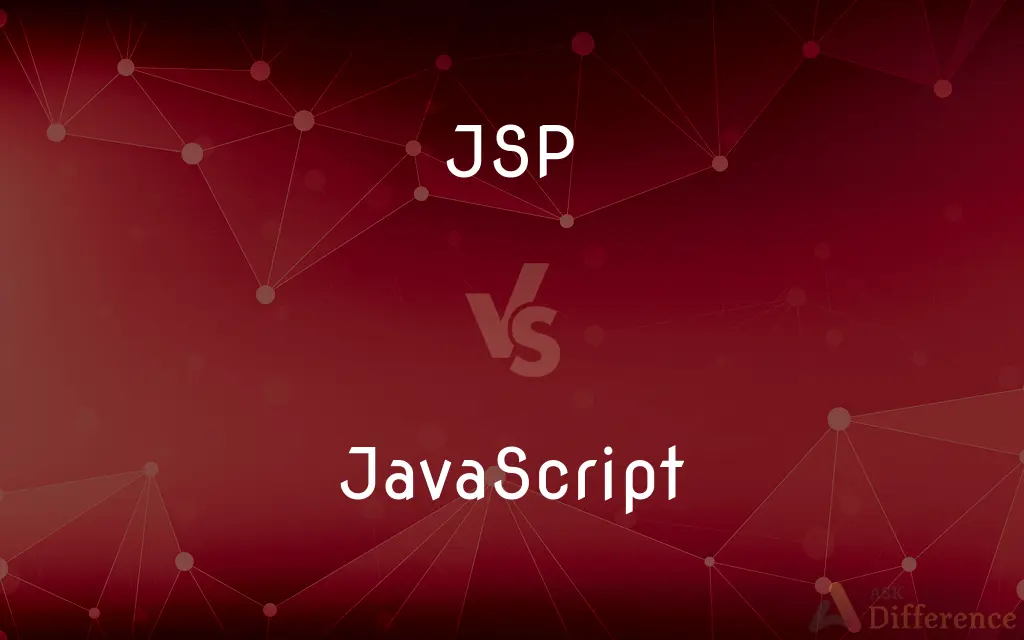JSP vs. JavaScript — What's the Difference?
By Tayyaba Rehman — Published on January 25, 2024
JSP (Java Server Pages) is a server-side technology used to create dynamic web content, while JavaScript is a client-side scripting language used to create interactive effects within web browsers.

Difference Between JSP and JavaScript
Table of Contents
ADVERTISEMENT
Key Differences
JSP is used for building web pages with dynamic content that change based on server-side data and user interaction. It runs on the server and generates HTML or XML that is then sent to the client's browser. In contrast, JavaScript operates on the client's browser and directly manipulates the Document Object Model (DOM) of a web page, enabling interactive features like animations and form validations. JSP is server-side, whereas JavaScript is client-side.
JSP is part of the Java technology family, allowing for embedding Java code in HTML pages. It is often used to create web pages that interact with databases and server-based applications. JavaScript, on the other hand, is a versatile scripting language that can interact with HTML elements and is supported by all modern web browsers. While JSP leverages Java for dynamic web content, JavaScript enhances user interfaces with interactivity.
The execution environment for JSP is a Java-enabled server, such as Apache Tomcat or IBM WebSphere. It requires a Java runtime environment. JavaScript runs within the user's web browser, requiring no additional server-side processing. This fundamental difference affects their roles in web development: JSP for server-side processing and JavaScript for client-side dynamics.
JSP is often used in enterprise-level applications and large-scale web projects due to its robustness and scalability. JavaScript, with its ease of use and wide adoption, is essential for almost all web pages for adding user interactions, regardless of the scale of the project. JSP is more common in back-end development, while JavaScript is ubiquitous in front-end development.
Comparison Chart
Operation
Server-side technology
Client-side scripting language
ADVERTISEMENT
Primary Use
Dynamic web content generation
Creating interactive web pages
Execution Environment
Java-enabled web servers
Web browsers
Typical Applications
Enterprise web applications
All web applications
Language Family
Part of Java technology
Independent scripting language
Compare with Definitions
JSP
Java-Based
JSP allows embedding Java code in web pages for server-side logic.
JavaScript
Front-End Development
JavaScript is essential for modern front-end web development.
JSP
Dynamic Content Generation
We use JSP for pages that display real-time data from the server.
JavaScript
Web Browsers
JavaScript runs directly in the web browser, enhancing user experience.
JSP
Server-Side Technology
JSP is used for creating dynamic web pages on the server.
JavaScript
DOM Manipulation
With JavaScript, we can dynamically change content on a web page.
JSP
Enterprise Applications
Our enterprise web application is built using JSP for its robust features.
JavaScript
Client-Side Scripting
JavaScript is used for adding interactive features to websites.
JSP
Web Servers
JSP applications are deployed on Java-enabled servers like Apache Tomcat.
JavaScript
Interactive Web Pages
We use JavaScript for client-side form validation.
Common Curiosities
What are the advantages of JSP?
JSP is powerful for creating complex web applications, integrating easily with Java-based back-end systems.
Is JavaScript only used in web development?
While primarily used in web development, JavaScript is also used in server-side applications (Node.js), mobile app development, and more.
What are the advantages of JavaScript?
JavaScript enhances user experience with interactive elements and is universally supported by web browsers.
What is required to learn JSP?
A basic understanding of Java is required to effectively use JSP.
What is JSP?
JSP is a server-side technology used to create dynamic web pages using Java.
What is JavaScript?
JavaScript is a scripting language used on the client-side for making web pages interactive.
Can JSP and JavaScript work together?
Yes, JSP can generate dynamic content on the server, which can be manipulated by JavaScript on the client side.
Is JSP a programming language?
No, JSP is a technology that uses Java code embedded in HTML to create dynamic web content.
How does JavaScript interact with HTML and CSS?
JavaScript manipulates the DOM, allowing it to dynamically change HTML content and styles defined by CSS.
Do I need a Java server to run JSP?
Yes, a Java server like Apache Tomcat is required to process JSP pages.
Can JavaScript be used for server-side programming?
Yes, with technologies like Node.js, JavaScript can be used for server-side programming.
Can JSP generate HTML content?
Yes, JSP is often used to dynamically generate HTML content on the server side.
Do modern web applications use both JSP and JavaScript?
Yes, many modern web applications use JSP for server-side logic and JavaScript for client-side interactivity.
Can JavaScript run outside the browser?
Yes, JavaScript can run outside the browser, especially in server-side environments like Node.js.
Is learning JSP necessary for all web developers?
Not necessarily. It's beneficial for those working on Java-based web applications but not mandatory for all web developers.
Share Your Discovery

Previous Comparison
PUBG Mobile vs. PUBG PC
Next Comparison
ISBN 10 vs. ISBN 13Author Spotlight
Written by
Tayyaba RehmanTayyaba Rehman is a distinguished writer, currently serving as a primary contributor to askdifference.com. As a researcher in semantics and etymology, Tayyaba's passion for the complexity of languages and their distinctions has found a perfect home on the platform. Tayyaba delves into the intricacies of language, distinguishing between commonly confused words and phrases, thereby providing clarity for readers worldwide.
















































